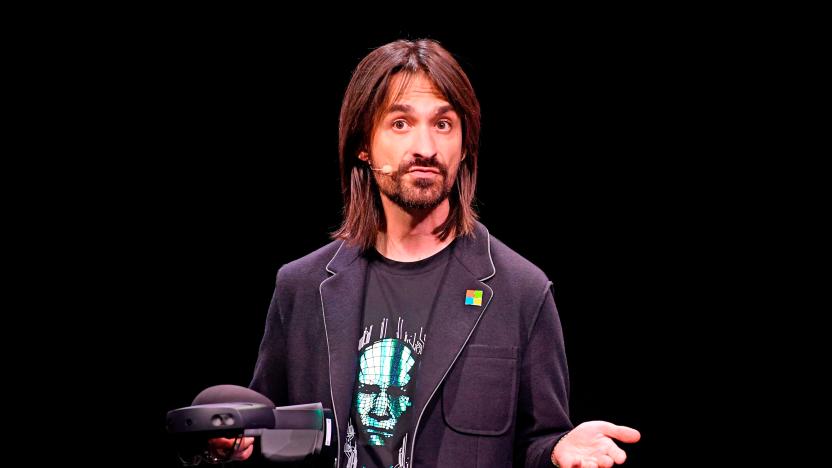Alex Kipman
Latest

HoloLens chief Alex Kipman is leaving Microsoft following allegations of misconduct
The company is splitting the HoloLens team after his departure.

Microsoft shuts down AltspaceVR's social hubs to combat harassment
Microsoft is making a handful of changes to AltspaceVR to combat harassment within the virtual reality app.

HoloLens is not dead, says Microsoft's mixed reality chief
Microsoft has not abandoned development on HoloLens 3, according to the technical fellow who leads the company’s mixed reality division.

Kinect support coming to XNA 'in the future'
Good news: Microsoft has plans to offer Kinect development tools to XNA developers. Confirmation comes via Xbox director of incubation Alex Kipman, who said during an interview on Talk of the Nation that, while there's no current Kinect functionality in XNA, it's something Microsoft "will support in the future." Honestly, we're thrilled -- haven't you seen some of the awesome stuff people are coming up with ... without the proper toolset? The Talk of the Nation episode on which Kipman appeared focused on Xbox 360's new camera peripheral, which Microsoft is pleased to see developers tinkering around with ... to a degree. Hacking the device, which Microsoft classifies as someone accessing "algorithms on the side of the Xbox" for ill-use, or someone exploiting Kinect in a cheating manner is not tolerated. Creating a driver that might "open the USB connection" or one that "reads the inputs from the sensor," on the other hand, are uses that are totally cool by Microsoft. Microsoft offered no timetable for when Kinect support would come to XNA, so in the meantime, keep those "good" hacks coming!

Microsoft: I'm a PC, and Kinect open-source drivers were my idea
When word first reached Microsoft that the open-source community would hack the Kinect, the company's response was pretty heavy-handed: "Microsoft does not condone the modification of its products," a rep told CNET, pledging to "work closely with law enforcement and product safety groups to keep Kinect tamper-resistant." But now that Kinect mods blow our minds on a near-daily basis, Redmond has changed its tone. Microsoft's Alex Kipman told NPR Science Daily listeners that as far as the company's concerned, the Kinect hasn't actually been hacked thus far, and that Microsoft actually left the camera's USB connection unprotected "by design" to let the community take advantage. Though he and fellow Microsoftie Shannon Loftis wouldn't commit to official PC software drivers for the device, he did say that the company would "partner sooner rather than later" with academic institutions to get the hardware doled out, and suggested that some universities started playing with Kinect even before its commercial launch. Read a transcript of the pertinent section of the podcast after the break, or listen for yourself at our source link starting at the 18:22 mark. [Thanks, Fred T.]

Kinect will use only a 'single-digit' percentage of Xbox 360 CPU power
What do you know, someone's been busy working in Microsoft's labs while we've been waiting for the company's Kinect motion control peripheral to launch itself into our living rooms. The highly sophisticated webcam has undergone some algorithmic optimizations and now Alex Kipman, lead software developer for what used to be known as Natal, tells us that its processing overhead for the Xbox 360 console will be no greater than a "single-digit" percentage. That contrasts very nicely with the last number Alex gave us, which indicated there'd be a 10 to 15 percent penalty for using Microsoft's new motion controller, and should mean your petting sessions with Kinectimals will be running smooth as butter when Kinect hits stores tomorrow. Great news, eh?

First Kinect prototype cost Microsoft $30,000
Grumbling over the prospect of spending $150 on a Kinect sensor? At least you didn't have to drop $30,000 to get your Sonic Free Riders on. The NYT reports that the first Kinect prototype cost Microsoft that much to build -- which kind of makes the fact that Microsoft was able to get that technology into a $150 box (on each sale of which, the Times' Ashlee Vance notes, MS will profit) a bit more impressive. The article provides a tidbit of new information about how the device recognizes people. In the case of identical, identically-dressed twins, the Kinect's software will evidently distinguish between the two by asking each to identify him or herself. "'If it can't disambiguate, we say, 'Please tell us if you are A or B,'" Xbox director of incubation Alex Kipman said. "Then, you end up with the equivalent of a different bar code." You'll be able to turn your family into bar codes on November 4.

MS developer talks tech, Natal 'correctly positions your hand even if it's held behind your back'
We now know that Natal is going to make it out before the end of the year (if all goes well), but the company is still keeping a lot of secrets about the technology and being rather stingy with hands-on time. Natal lead developer Alex Kipman is spilling a few notable beans, however, indicating that the team has gathered terabytes of photos and video of people playing games, amassing a library of data that the system uses to anticipate where you might move next. Because of this the system can predict your hand position, even if it's obscured, based on the location of other parts of your body. He also indicated that the software required for all this will only take up about 50MB on your Xbox's (probably near-full) storage device, and that the algorithms it uses will suck down about 10 to 15 percent of the 360's overall processing power. That's certainly a substantial hit, but this is the price you pay for getting to kick virtual balls with physical feet.




